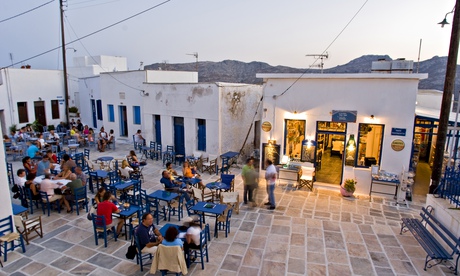
Whatever happens, I’m heading for Greece this summer. Once upon a time that would not have sounded like a political statement, but it does today. And yet I am only going to Greece for the same old reasons I ever did: warm breezes off the sea well into October, traces of ancient heritage, the elemental, straightforward lifestyle, and to try, once again, to convince myself that retsina tastes good. And what could be more straightforward than putting your money, and your faith, in a place that you know and love?
Three years ago – when Greece was in one of its frequent “this is the end of everything” moments – I was sitting at a dining table on a beach in the Peloponnese. The restaurateur had moved it there – “Because you will like it!” – and then he sat down and started sloshing wine into glasses. There were Greek friends with me. I hadn’t known any of them for more than 24 hours. The table seemed to exert a gravitational pull, gathering people to it, all talking of whether tourists would come, of whether livelihoods would survive. But before too long, laughter broke out and somehow the financial crisis evaporated … and no one mentioned it again.
A fisherman’s catch was examined and a ridiculous quantity dispatched to the grill. More wine arrived; another table was added. The party got bigger. For people anxious about their financial future, I thought they showed a remarkable ability for wild feasting. Perhaps it was pagan superstition to fool the gods of bleak austerity. I liked that. I didn’t want the evening to end.
In normal years, around two million Britons visit Greece, contributing to the 18% of GDP that is the tourist industry. For many areas it is the only industry of any value. All those small, independent guesthouses and hotels need the lifeblood of visitors. Without them the Greece we know and love will disappear – not because of any banking over-lending balls-up, but because our money didn’t reach the right people. It’s the same as any worthwhile way of spending your spare cash: African wildlife needs it, as do Amazonian rainforests and eco-lodges, as well as that grizzled old veteran who runs the taverna by the fountain. Let’s not rely on banks to keep what we love alive.
There are some practical objections, however, to visiting during this particular crisis. I don’t want to carry so much cash. There’s money in the banks, but many operators are advising taking more cah. It might be necessary: time to dig out the old pre-ATM money belt? But many places, hotels included, are still accepting credit cards. Nothing will be open. Rational voices from within Greece say this is untrue. Food will be hard to find. Will the sardines not be in the sea? Social unrest could happen, I might get stuck. Well, in summer 2011 I entered a hotel lobby in Fiji to be confronted by TV images of a major city erupting into violence and flames. I later realised it was London. It can happen anywhere. Perhaps eyewitness reports are best: as I write, an email arrives from Marianna Karakoulaki, a journalist from Thessaloniki, telling me that she has personally seen no shortages at all.
The day after that memorable dinner on the beach, my new friends and I walked to the ruins of a temple and watched as Greeks dressed in traditional tunics paid homage to the ancient gods. They were opening the Nemean Games, an athletics competition that traces its roots back to 573BC. Later on, I ran a foot race through the hills of Corinth, a mad pursuit that finished in the ancient stadium. The reasons for being there seemed so obvious: to be part of that epic occasion, that culture and landscape. Financial crises seemed irrelevant. If only those suits who create these storms would spend more time away from computers and mobile phones. Can I suggest an island beach, or an olive grove, their hands clutching a brimming beaker of the warm south? But maybe not the retsina.

